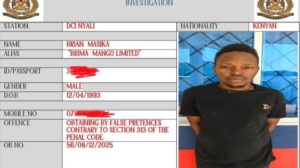The fight against corruption in public offices has once again come into the spotlight after the arrest of a senior government officer in Busia County.
On Tuesday afternoon, officers from the Ethics and Anti-Corruption Commission’s Western Regional Office arrested Busia Land Registrar Collins Aiela Liyayi in connection to a bribery case.
He was accused of demanding and receiving a bribe of ten thousand shillings from a member of the public before releasing a processed land title deed.
The officer is said to have withheld the document, insisting that it would only be handed over once a “release fee” was paid, a move that sparked investigations into his conduct.
According to the EACC, this arrest followed several complaints from residents of Busia who claimed that seeking services at the Lands Registry had become frustrating and expensive due to bribery demands. It was reported that the registrar had made it a common practice to delay or withhold processed title deeds until bribes were given.
This pattern of corruption was flagged by multiple people who felt that their right to access public services was being abused.
Following his arrest, the suspect was escorted to the EACC Western Regional Office in Bungoma, where he was formally processed before being booked at Bungoma Police Station.
He is expected to undergo further legal procedures as investigations continue. The Commission has emphasized that such arrests are part of its wider efforts to restore accountability and integrity in public institutions.
By targeting individuals who misuse their positions of power, the EACC hopes to send a clear message that corruption will not be tolerated, especially in areas where the public depends heavily on government services.
The Lands Registry is one of the most sensitive offices in the country because it handles important documents that determine land ownership and security of property.
For many Kenyans, acquiring a title deed is often a long and costly process. The introduction of bribes as an extra burden not only delays services but also denies ordinary citizens their rightful access to property ownership.
This creates mistrust in government systems and encourages the cycle of corruption to continue. That is why the EACC has prioritized close monitoring of such offices to ensure that people are served fairly and lawfully.
The ongoing crackdown on bribery is part of a wider campaign to make public services more transparent and accessible. The EACC has promised to scale up its surveillance and intelligence gathering to identify officers who exploit their positions for personal gain.
Kenyans have also been urged to continue reporting corruption cases so that action can be taken swiftly. The arrest of the Busia Land Registrar is therefore not just an isolated case, but part of the effort to ensure that Kenyans can trust the systems meant to serve them.
At the heart of these actions is the goal of protecting the public and ensuring equal access to essential services without intimidation or exploitation. The Commission hopes to rebuild confidence in public service and remind officials that their duty is to serve, not to exploit.





















Add Comment